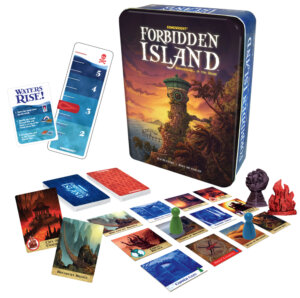I ended a recent post by noting that games can be used as markers of life. We can remember (hazily) the times in college when we played hack-n-slash D&D as a drinking game (and what ever happened to the people we were dating at the time?). But at other moments, our lives and world are sufficiently memorable. I hosted a game day on a recent Saturday, the 11th of September. We didn’t spend a lot of time talking about what that date meant, but we also couldn’t avoid it.
There’s not really a good transition after that topic, and yet we have to keep going. So I think the point here is that we bring the rest of our lives with us to the game table, and that the rest of the people around the game table—old friends or relative strangers—will bring a lot of their lives with them, too. Perhaps their grandmother just got arrested for shoplifting, or they had three tons of gravel delivered to their house due to a typo on an order form. Whatever’s going on, you, the host, need to keep things running smoothly, and I admit that I’ve not always been good about maintaining that smoothness. Still, a bit of roughness here and there shouldn’t grind your game day to a halt.

The recent Owl House Game Day is a pretty good example of how an event can go. One player showed up at the early start time, and I was glad that I had set out my Crokinole board. We spent some time flicking disks and chatting about life. I don’t want to brag about my astonishingly fast reflexes, but I assure you that if it weren’t for espresso-turboed muscle twitching I’d be wearing an eyepatch right now. I’m drinking rum in honor of that non-existent patch. Other players showed up over the next few hours, and we ended up with six altogether. Not a bad number. But part of my role during the event was to make introductions and to keep the conversational ball in the air (a volleyball, not football, metaphor) during slow points and between games. It’s wonderfully useful to have games to talk about, and that certainly helps to keep the conversation moving.
Like many other game days, once everyone was in place we played a lot of different titles over the course of the evening.
Chrononauts (an easy game to stop and re-start), Werewolf (on the iPad…an interesting experience), Forbidden Island (we died twice), and a late game of Bohnanza (without a single fart joke).
And I had an insight just before the rest of the guests wended their ways past the plants on the front porch and into the house: don’t explain all the games, give space to the people around you. Make sure that they get to play one of the games they brought, or at least get to explain a game that you own but they might have played more. I’m learning this lesson because I have a toddler in my life, and one of the ways to make her happy is to give her autonomy (or the illusion of autonomy—we’re very Orwellian, my wife and I, in cultivating this particular illusion). I’ve noticed that I, too, am happier when I get to make meaningful choices and when I contribute—again, meaningfully—in my community (and I’m thinking family, workplace, neighborhood, and so on). When gamers come over to play games at your house, remember that the issue at stake is not you and your house. The issue is fun. And games.
But do make sure have enough to eat and drink.
- Titan Comics for February 21st, 2018 - Feb 17, 2018
- The Gardeners and the Panda?: A Review of Takenoko - Jan 25, 2012
- You Made a Time Machine Out of a DeLorean? Back to the Future – The Card Game Reviewed - Jan 8, 2012